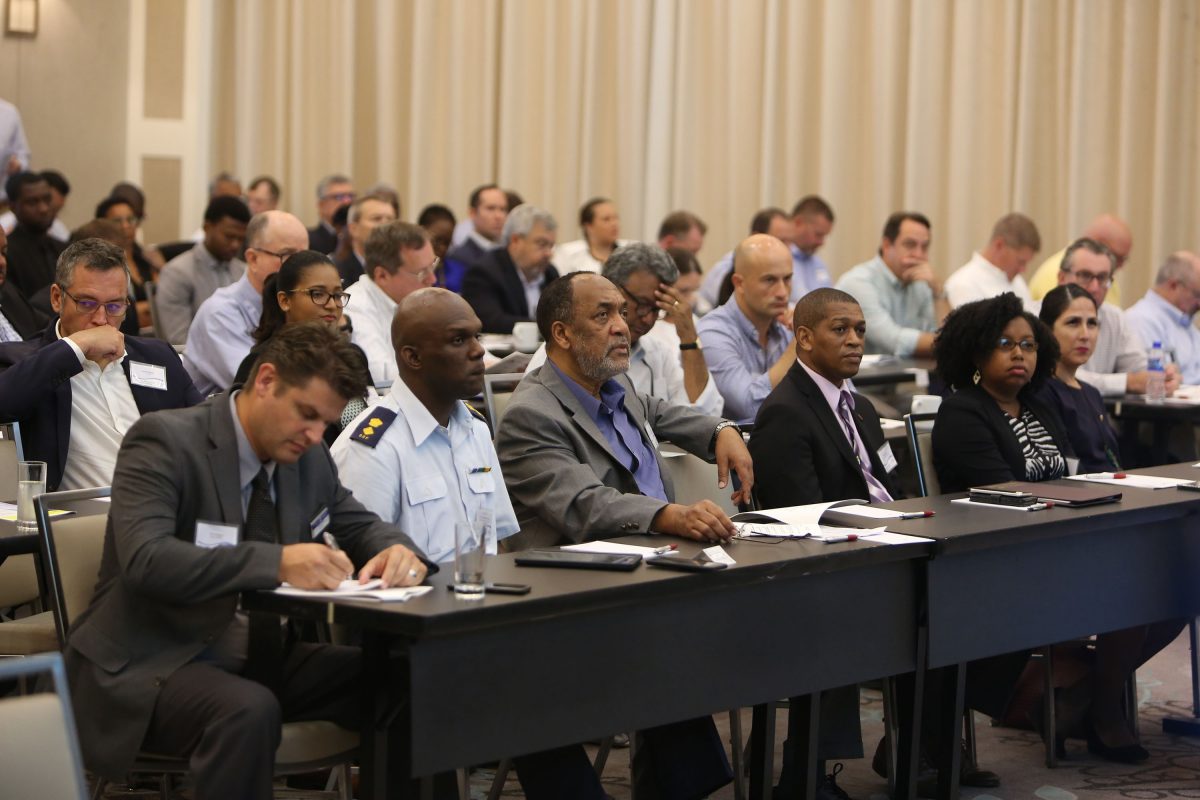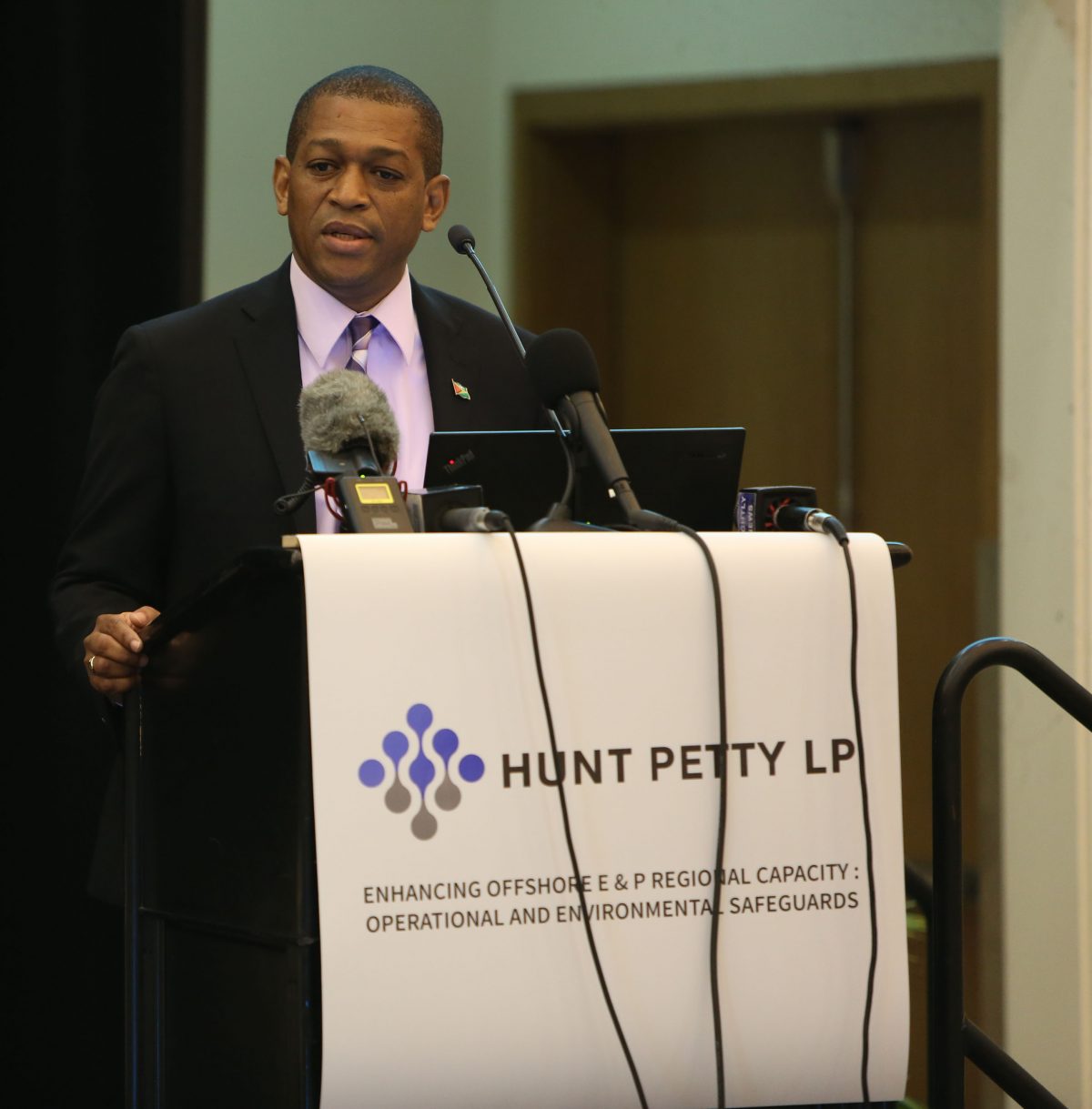Commending government’s efforts to develop an oil spill response plan as the country is poised to become one of the most active offshore oil exploration and production (E&P) centres in the region, a United States (U.S.) government official yesterday pledged continued assistance.
“Over the past year, the Department of State and U.S. Coast Guard have been working with Guyana’s Department of Energy and its Civil Defence Commission to assist with the development of its National Oil Spill Contingency Plan,” U.S. State Department Desk Officer Seth Wikas yesterday said during the start of a two-day conference enhancing offshore E&P Regional Capacity with a focus on operational and environmental safeguards at the Marriott Hotel, Georgetown.
“With Guyana’s oil resources coming online imminently, we commend the Guyanese government in its foresight to develop this plan, and look forward to working with them on this important document. The assistance on the National Oil Spill Contingency Plan follows years of engagement the Department of State has had with Guyana under the Energy Governance and Capacity Initiative, or EGCI,” he added.
EGCI, Wikas explained, is a Department of State-led effort that provides U.S. interagency and independent expert advisory services in countries across the globe to build capacity related to oversight and governance of the hydrocarbon and mineral sector’s.
“Countries receiving EGCI assistance have world-class hydrocarbon and mineral resources. These countries have the potential to receive sizable financial windfalls from the development and export of these resources,” he said.

He noted that from 2010 to 2018, EGCI supported the Guyana government in its efforts to manage its upstream oil and gas sector effectively and responsibly. “EGCI engagement increased in 2015, when ExxonMobil made its first major offshore oil discovery, radically reshaping the country’s energy landscape and long-term economic prospects. The Department of State recognised the need for the necessary regulatory, legal, and policy structures to ensure sound governance and sustainability in this emerging upstream sector,” he noted.
The U.S. Army’s annual Southern Command-sponsored combined joint exercise, Tradewinds, will be held in Guyana next year and a component is focused on oil spill response.
CDC head, Lieutenant-Colonel Kester Craig said that he was pleased to know that Guyana will be the host country, where some 21 participating nations will meet and get a firsthand experience of this country’s terrain.
Wikas also reminded that over the course of the programming period, EGCI’s implementing partners at the U.S. Departments of the Interior and Treasury conducted workshops and provided technical support. “They introduced cutting-edge practices in the regulation and management of deep water oil exploration and production. EGCI provided financial advisory support to help prepare for managing anticipated oil sector revenues, and engaged on oil spill preparedness and response planning with the U.S. Coast Guard. With EGCI assistance, Guyana was also able to initiate the process to join the Extractive Industries Transparency Initiative, EITI, to ensure the public knows where oil revenues are going,” he said.
And while EGCI programming in Guyana wound up last year, after nearly a decade of assistance and engagement, the Department of Treasury’s Office of Technical Assistance continues to build the capacity of the Guyana Revenue Authority. The training given to auditors of the tax agency’s large taxpayers division, the U.S. hopes, will equip them “so that they are able to confidently manage the windfalls which are to be expected over the coming years.”
Critical decisions
Wikas also underscored that the U.S. government hopes that Guyana will rely on the long period of sustained engagement and assistance, which produced expert reports on best-practices in oil sector management, and not just leave them but use their findings as a reference in its decision making processes. “We hope the government references these reports and recommendations as it makes critical decisions in the months and years ahead,” he said.
U.S. oil and gas consulting firm Hunt Petty LP is coordinating the two-day conference and former President and Chief Executive of the International Association of Drilling Contractors (IADC) Dr. Lee Hunt, who is a partner in the company, told Stabroek News that the idea for the conference was birthed following a meeting with Guyana’s Ambassador to the U.S. Riyad Insanally and Energy Department head Dr Mark Bynoe.
“…We discussed how to best educate a general audience of government and local stakeholders on the critical issues surrounding the initial development of an oil and gas field. That was the idea for the conference. We came down in April, we met with some of the directors and vice directors of the University [of Guyana] and I proposed this agenda, which starts with a concept, the thing people most worry about—an oil spill,” he explained.
“We should really direct attention to all that is being done by industry and government, not just the Guyana government but the international governments, to cooperate and developing the best techniques of preventing oil spill and the latest technologies available for responding in case one happens. So that was the central core of the conference. Around that, we talk about what is necessary to enhance capacity,” he added, while detailing the planned sessions.
From his experience of working in a number of countries around the world, Hunt said Guyana is better poised in terms of access to investments, access to prolific discoveries compared to others, especially African oil nations. “I am very pleased with what I see here, in terms of their commitment, in terms of their willingness to learn, very actively seeking information international sources for best practices,” he posited.
And while he points out that this country has a good system on paper, he says that there is “a lot of need here for the physical development of facilities- onshore bases, training, education.”
Hunt believes in educating persons on the industry and what is needed for oversight and how to coordinate resources not just locally but regional and internationally. “They need to learn from the industry… and be prepared to support that with the kind of infrastructure and kinds of capacity. For example, to respond to an oil spill, you need facilities for vessels, for cranes, for housing of personnel for transportation and that is one of the aspects of this conference. We are talking helicopters, vessels… they are all needed to come together… multiple operations going on at the same time and that requires the intense cooperation and coordination at the same time. EPA, Civil Defence, Department of Energy and so forth. We are trying to bring all of the parties together with an interest and general overview of education and go from there for further development,” he said.










